
On a cool fall day, I walked outside and felt the fresh air against my skin. My mother, Helen, was making breakfast, and as was our routine, I was heading to the bakery to get fresh rolls. I had no idea that this day would be completely different from any other.
Sharing breakfast was our special custom, a practice that gave structure to our small household. You may question why a man of thirty continued to live with his mother. The reason was straightforward: I had no father. He departed when my mother told him she was expecting a child. We both lived with that solitude, and so we formed our own family unit, just the two of us.
Regarding romance? In truth, there was none. I had never been particularly outgoing, and good looks were never something I possessed. Forming relationships had always been difficult, and in the end, I stopped trying altogether. I dedicated myself instead to programming, coding during the day and repairing electronics at night.
That morning, my shoe hit something solid on the pavement. Glancing down, I discovered a phone, its screen shattered into a web of cracks, discarded in the grass near the edge of the walkway.
Interest stirred within me. I picked it up. The body was scuffed and partly coming apart, as if a car had driven over it. It wasn’t worth anything—an outdated model with buttons—but something about it captured my attention.
“Maybe I can repair this,” I said quietly.
I put it in my pocket and went on to the bakery, but my thoughts stayed fixed on the phone. It wasn’t only the condition it was in—it was the way it had been abandoned, as if dropped in a hurry.
Once home, after eating with my mother, I recalled the phone. I took out the SIM card and put it into an old phone I had, hoping it still functioned. A series of contacts showed up, mostly for hospitals, schools, and emergency services. Only one was labeled “Daughter.”
A feeling of concern washed over me. Who had owned this phone? Why did it seem like the only person that mattered was this “Daughter”? Without thinking, I called the number.
A young, shaky voice answered. “Mom?!”
I was speechless. “I—I’m not your mother. I’m sorry,” I stumbled over my words. But what the girl said next halted me completely.
“Where is she?” Her voice trembled.
“I don’t know,” I confessed. “I discovered this phone. Can you tell me who you are?”
“My name is Julie. My mom went to the store yesterday and never returned,” she explained, her voice cracking.
My heart felt heavy. “Is there a dad, or a grandmother, someone you can contact?”
“I don’t have a father. Or a grandmother. It’s only my mom and me,” she said softly.
I asked if she knew her address. “Independence Street. Building 7, Apartment 18.”
“Are you alright? Are you by yourself?” I asked urgently.
“Yes… I’m alone. But I can’t walk. I use a wheelchair,” she told me.
My urge to protect surged forward. “Julie, I’m on my way. I’ll be there very soon.”
My mother, who had been listening, immediately took her coat. “You aren’t going by yourself,” she stated decisively. “If a child requires assistance, we provide it.”
We took a taxi and were there in fifteen minutes. The structure was dilapidated, the corridors lit by unsteady lights, the mailboxes stuffed. I knocked on the door of Apartment 18, uncertain of what I would find.
A small girl in a wheelchair looked out from the main room, her hair unkempt, her eyes alert but exhausted. “Will you help find my mom?” she asked, shaking.
I got down to her level. “We will. But first, we need to ensure you’re okay. Do you have anything to eat?”
“No,” she replied.
Helen quickly made food while I looked online. My stomach tightened when I discovered a news article: a woman had been struck by a vehicle the previous day on Parkova Street. She was in serious condition.
I phoned the medical facility and verified it was Victoria—Julie’s mother. She was stable but not awake. My mother and I made the choice to leave Julie with our neighbor Maureen while we went to the hospital.
Victoria woke up slowly. Pale and injured, but alive, she saw Helen and me. Her eyes filled with tears. “Julie… is she safe?”
“Yes. She’s okay. She has been waiting for you,” I told her.
Victoria shared her history—left alone as a youth, single-handedly raising Julie, facing hardship after escaping a violent marriage, and feeling unable to ask for support. I felt deep sorrow for her.
“I will support you,” I assured her. “Julie should have an opportunity.”
Through fundraising and a medical expert, we scheduled an operation for Julie. Months later, she walked her first steps, unsteady but triumphant, gripping my hand. Victoria, now healed, wept with thankfulness.
As time passed, our connection grew stronger. I developed feelings for Victoria, and we built a life together as a family. Julie, the girl I had helped rescue, truly became my daughter.
I never expected to discover a family in such an unforeseen way—but now, next to Victoria and Julie, I understood that I had at last discovered where I belonged. And I would not exchange it for anything in the world.